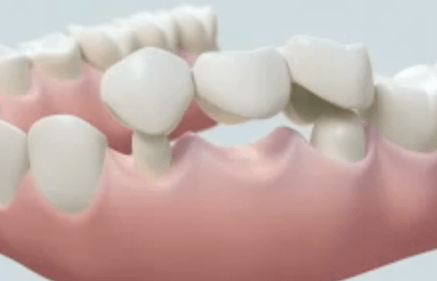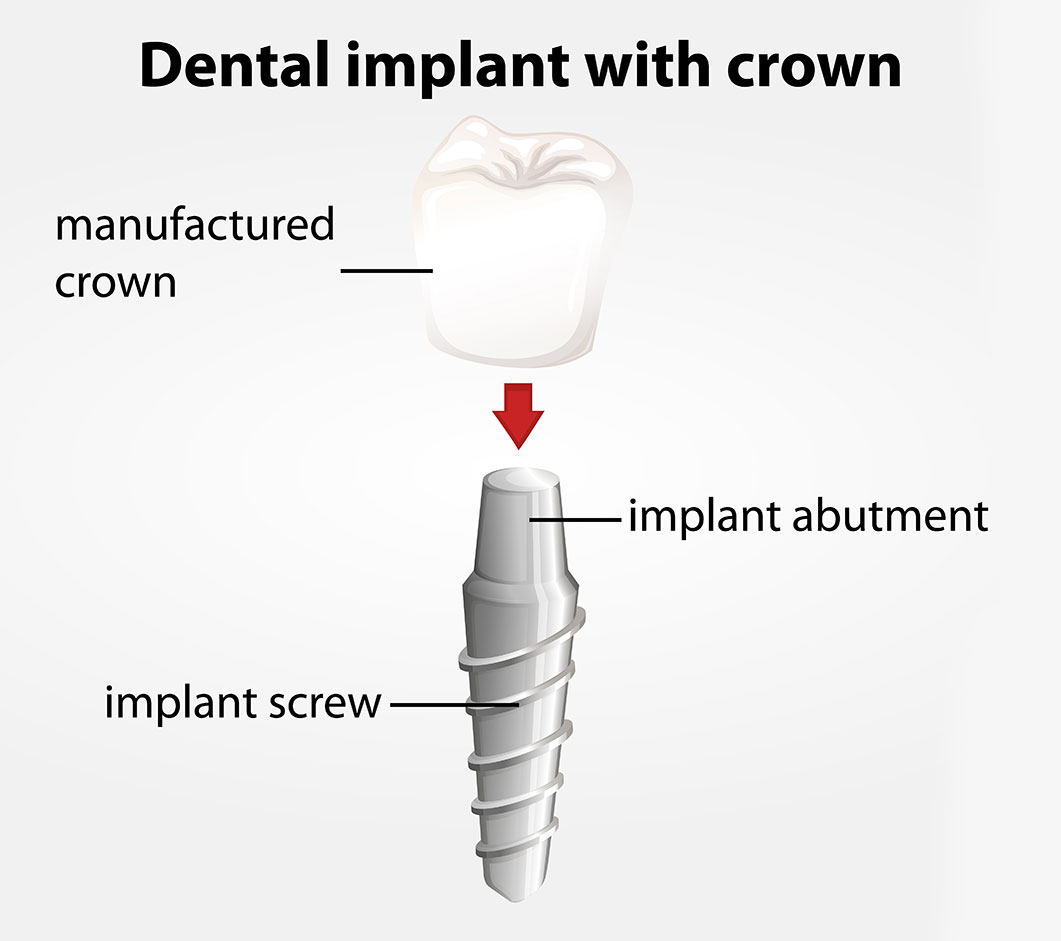When replacing a single tooth, the two best options are dental implants or bridges. So, what are the differences between an implant and a bridge, how do you know which one’s best for you, and how much do they cost? We know that what’s best for someone else isn’t always going to be best for you; your individual needs play a large role in what option you should choose. In this article we’ll pit implants vs. bridges and learn which one wins for you.

Dental bridges have been around for longer than dental implants. They are a reliable, easy way to replace teeth, but they have some disadvantages.
What are dental bridges?
A dental bridge is a fabricated tooth that rests between the two adjacent teeth where the missing tooth was before, filling in the gap. The new prosthetic tooth sits above the gums, held there by your healthy teeth.
To create a bridge, your dentist will remove a small amount of enamel from the two teeth next to the gap. Next, they’ll fit the fabricated tooth between them. It’s that simple. A bridge attaches to your natural teeth almost like puzzle pieces.
Dental bridges have been around longer than dental implants. They’re a reliable, easy way to replace teeth, but most dentists and prosthodontists still prefer implants because of their longevity and health benefits.
What are dental implants?
Dental implants are stand-alone tooth replacements. With dental implants, other teeth aren’t used to hold the replacement tooth in place. Instead, the dental post attaches to your jaw and your replacement tooth connects to the post. It’s almost the same as a real tooth.
While bridges only replace the crown of your tooth (the part of the tooth visible above the gum line), dental implants include an implant post that reaches beneath the gums, replacing every part of the missing tooth. Replacing your missing tooth root has health advantages, but the procedure isn’t for everyone and can be complex for some patients.
Bridges: pros and cons
There are pros and cons for each option. But generally, dental implants are better for your health, and they hold up much longer. The problem with implants is that not all patients are good candidates for the procedure. Also, the cost difference can sometimes push patients toward bridges.
Despite comparing unfavorably against implants in some ways, dental bridges are still very reliable, and they’re definitely worth considering.
Here are the advantages of choosing dental bridges:
- You won’t need surgery
- Jawbone density isn’t an issue
- It’s the easiest way to replace a tooth that’s been missing for years
- It’s less expensive
However, the disadvantages of dental bridges include:
- Jawbone tissue degenerates faster than if you had opted for an implant
- Your prosthodontist removes enamel from your healthy teeth so that the bridge can be attached
- The teeth adjacent to the gap become more susceptible to decay
- Bridges typically only last eight to fifteen years before requiring replacement
Dental implants: pros and cons
When it comes to dental implants, on the other hand, you’re facing an entirely new set of considerations. Even though the option is better for most people, you might find that it doesn’t work for you. Price is certainly an important factor, but despite the higher price tag, dental implants are an investment that pays off in the long run.
Here are many of the advantages associated with dental implants:
- Dental implants usually last a lifetime and never need replacement
- The implant post fuses to your jawbone, maintaining bone density and health—a process called osseointegration
- Your implant acts almost exactly like a real tooth, requiring the same upkeep as a natural tooth
- Adjacent teeth aren’t affected negatively by the implant
- Dental implants are less susceptible to cavities or decay-related problems that are associated with your natural teeth
For all their advantages, dental implants still have some downsides:
- Bone density in the jaw must be sufficient to support the procedure
- The process takes considerably longer to complete, especially if you need a bone graft
- You’re almost sure to need a bone graft if your tooth has been missing for a long time
- Complications can occur if your dentist isn’t experienced in placing implants
- Implants require minor surgery
Cost estimates: implants vs. bridges
According to the Dental Implant Cost Guide, the average cost of a dental implant in the US is about $4,000, excluding bone grafts, tooth extractions, X-rays, or CT scans. With additional procedures included, the price can be anywhere from $5,000 to $10,000. That’s a large difference, and it’s worth asking your dentist to perform free preliminary tests to see if you’re a good candidate for the procedure, so that you can know what it’ll cost you. Doing your research now will help you out later, but you need to talk to your prosthodontist before taking any irreversible steps.
The average cost of a bridge ranges from $1,000–$4,500, depending on the material used. Although this is considerably less up front, you should consider what this will cost if you need to replace them every decade. An implant can be as little as $1,500, so it definitely isn’t the case for everyone that implants are more expensive. Each case is different because every patient is different.
Which one’s right for you?
If you’re still trying to decide which wins for you when it’s implants vs. bridges, you should get someone else’s input. It’s good to do some research before beginning the conversation, but nothing beats talking through your questions with an expert.
At Dr. Stone’s practice, we offer complimentary consultations to new and prospective patients. We think the information to make intelligent oral-health decisions should be free. We won’t charge you a dime to stop by to talk. Schedule an appointment today!



